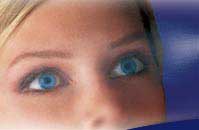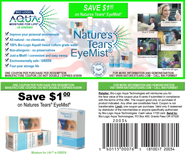
Women, Menopause and Dry Eye
Dr. Laurie Barber on Menopause and the Tear Film
Guest: Laurie Barber, MD (Little Rock, AR), Professor of Ophthalmology, University of Arkansas.
This is a paraphrased summary of an interview on the Sharon Kleyne Hour - Power of Water Internet radio talk show on World Talk Radio, Apple iTunes and Green Talk Network. Sharon Kleyne is an internationally recognized entrepreneur, water and health advocate, and Founder of Bio-Logic Aqua Research and Save a Child's Life Foundation. To hear the complete show, go to www.SharonKleyneHour.com
Dr. Laurie Barber, Professor of Ophthalmology at the University of Arkansas, is a well known dry eye specialist. For the last ten years, she has focused on dry eye and corneal inflammation. If the tear film is healthy, the eye is likely to be healthy. But there are many important substances in the tear film aside from salt water - hormones, antibodies, mucins, lipids and so forth.
In younger people, according to Dr. Barber, there are few dry eye symptoms. After age 35 or so, we sometimes lose the ability to keep the tear film healthy without helping it along. This is more the case with women than men. Dry eye after age 35 is believed caused by a drop-off in androgen, a male hormone. This occurs in both men and women. Dry eye symptoms include burning, itching, irritated, red eyes, blurred vision and. eye fatigue.
Regarding contact lenses, teenagers can usually physically tolerate them but may not be responsible enough to maintain them and keep them clean. Doctors are seeing an increase in corneal fungus and dry eye caused by dirty contact lenses.
Regarding menopause, Dr. Barber notes that men of the same age are also more prone to dry eye, especially men on prostate medication. The hormonal changes leading to menopause start at around age 35 and men have some of the same hormone fluctuations. Women have a lot more hormones and also a lot more dry eye.
Sharon asked about artificial tears. Dr. Barber said that they should be limited to four or five application a day, especially with eye drops containing preservatives. Regarding eye drop addiction, she stated that it is a common belief but that there are no actual studies. Most people only use eye drops for a short duration.
Sharon asked about the role of the skin around the eyes in dry eye. According to Dr. Barber, when you have dry eye, the eyelids are often inflamed and the eyelid skin is dry and flaky. The oil producing meibomium glands are located in the eyelid margins and the eyelids are also a "hot spot" for skin cancer.
Sharon pointed out the importance of keeping eyes naturally moist, drinking sufficient water (not coffee or soda), and eating all-natural green, leafy veggies, fruit and omega-3's.
Sleep is very important to natural eye health. It's important to truly rest your eyes at night, and allow them to recover, which means not wearing contact lenses to bed. The tear film restores itself while you sleep - the glands recharge, the pH drops, the natural water content increases, etc.
For menopause related dry eye, Dr. Barber's recommendations are the same as for hot flashes: Exercise, drink sufficient all-natural water, try to stay in a cool place and wear layered clothing so you can cool yourself off.
Sharon's Evaluation: Menopause is another area in which dry eye, poor lifestyle choices and lack of education can create numerous problems that could lead to serious eye disease, eye cancer and blindness. As I've said many times, we should be proactive about our natural health, lifestyle, nutrition and water intake at any age. And menopause is no exception.
CONTACT:
Bio-Logic Aqua Research - Rogue Media Division.1-800-FOR-MIST (367-6478)
RogueMedia@biologicaquaresearch.com
www.sharonkleynehour.com
whatistheeye.wordpress.com
www.biologicqua.com









